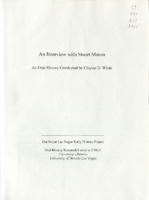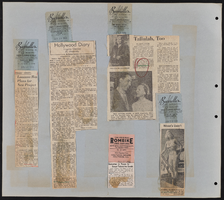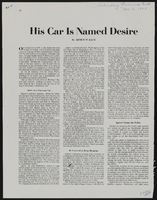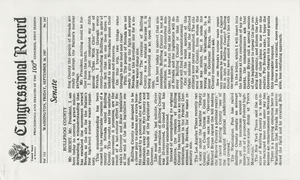Search the Special Collections and Archives Portal
Search Results
Rinker, C. A. Earle (Cleveland A. Earle), 1883-1965
Cleveland A. Earle Rinker was born in Indiana in 1883 to S. Cleveland Rinker and Isadora (Fenwick) Rinker. Shortly after his twentieth birthday Rinker went to Parker, Indiana, seeking work as a stenographer. He soon began working as a clerk for Thomas Condon, a coal and oil dealer who was also an enthusiastic investor in Nevada gold mines. Condon encouraged Rinker to seek his fortune in the gold fields and, in late October of 1906, Rinker boarded a train to make the journey to Goldfield, Nevada.
Person
Ruthe Deskin Papers
Identifier
Abstract
The Ruthe Deskin Papers (1933-2004) document Deskin's career as a journalist and community activist in Nevada. The papers include Deskin's "Back and Forth" columns, newspaper articles about Deskin, awards and certificates, legal documents, correspondence, photographs, obituaries and memorials, convention programs from the Nevada Press Association, and biographical ephemera. The collection also contains certificates recognizing Deskin's work with Nevada youth from Greenspun Junior High School and Ruthe Deskin Elementary School, as well as the Boy Scouts of America and the Clark County Juvenile Court.
Archival Collection
Hank Castro Music Business Records and Audio Recordings
Identifier
Abstract
The Hank Castro Music Business Records document Hank Castro's career in the music industry in Las Vegas, Nevada from 1969 to 1990. The bulk of the collection consists of original audio recordings from the Las Vegas Recording Studio. The collection also contains legal documents, personal correspondence, and promotional material related to the Las Vegas Recording Studio (1971-1985), songwriter agreements, and sheet music (the majority of the lyrics written by Hank Castro) from artists represented by the Las Vegas Recording Studio and Castro's other companies.
Archival Collection
James Cashman Sr. Papers
Identifier
Abstract
The James Cashman Sr. Papers date from approximately 1890 to 1969 and contain correspondence, photographs, insurance records, and bank records related to Cashman and his businesses in Southern Nevada. The collection documents the lives of the Cashman family and their businesses in southern Nevada.
Archival Collection

Transcript of interview with Irene Doty by Jackie Ogden, March 20, 1977
Date
Archival Collection
Description
On March 20, 1977, Jackie Ogden interviewed Irene Doty (born 1914 in Dangerfield, Texas) about her life in Southern Nevada. Doty first talks about the first casino properties and restaurants in Las Vegas along with some of the other businesses and operations of the area. She also describes some of her experiences as a justice of the peace, conditions during World War II, and the clothing fashion of the time. Doty also talks about some of her experiences in Goodsprings, Nevada, and about her experiences as a juror and potential juror in several murder trials. The interview concludes with a discussion on housing development and gambling in Las Vegas.
Text

Transcript of interview with Patricia Mulroy by Stefani Evans and Claytee D. White, January 03, 2017
Date
Archival Collection
Description
Patricia Mulroy served Las Vegas as the general manager of the Las Vegas Valley Water District from 1989 to 2014. She served the state of Nevada as the general manager of the Southern Nevada Water Authority from 1993 to 2014. Patricia helped to build the Authority, and saw the state through the devastating drought of the Colorado River. Patricia was born in Frankfurt, Germany on February 24, 1953. As a young girl, she lived in several different countries, but always felt that the United States was her home. Her experiences abroad fed her to develop a fascination with government work and state service. She arrived in Nevada in 1974 to attend UNLV. In 1989, Patricia became the general manager of the Las Vegas Valley Water District. She entered the field at a tumultuous time, facing the drought of the Colorado River and tension within the districts. She pioneered the Water Authority, which revolutionized Southern Nevada’s water rights system and allowed the districts to deal with the issue cooperatively. She worked with other Southwestern states and Mexico to support Las Vegas and Nevada through the drought. Patricia retired in 2014, but has chosen to remain active in politics and business. She is currently working with the World Bank in China on the World Economic Forum. She is also a nonresident Senior Fellow at the Brookings Institute, a faculty advisor for the Desert Research Institute, and a board member of the Wynn Board of Directors.
Text

Transcript of interview with Stuart Mason by Claytee White, November 9, 2006
Date
Archival Collection
Description
In this interview, Stuart Mason discusses his family's construction business, Taylor Construction Co., and his involvement with building various Las Vegas Strip hotels including Caesars Palace and the Riviera, and remodeling the Flamingo. He talks about working within a "social contract" with the various unions, and other aspects of construction.
Stuart Mason was born in Columbus, Ohio, and moved with his family to Miami, Florida, when he was two years old. He received his bachelor's degree in business administration from the University of Miami in 1958. Shortly after graduation, he married his wife, Flora, and started working for Taylor International, the family business. He came to Las Vegas in 1964 to start work on Caesars Palace as the assistant project manager and eventually took over the management of the business. Mason has contributed greatly to the city of Las Vegas over the years through his contributions in the development and construction of the Las Vegas Strip and his commitment to the community. He and Flora started the Nevada Chapter of the Juvenile Diabetes Research Foundation in 1970. In addition, they made donations to the UNLV University Libraries to benefit the Undergraduate Peer Research Coaches program, which helps undergraduate students obtain their college degrees. In addition to his work on Caesars Palace, Mason worked on the original and new MGMs, The Rivera, The International, the Stratosphere, and the Desert Inn, along with remodeling work at the Flamingo. Other company projects can be found in Miami, Jamaica, Aruba, the Grand Bahamas, Melbourne and Puerto Rico. His two sons took over the family business in 1997, the same year that Mason started as the Vice President of Development for the Venetian Hotel Casino.
Text



